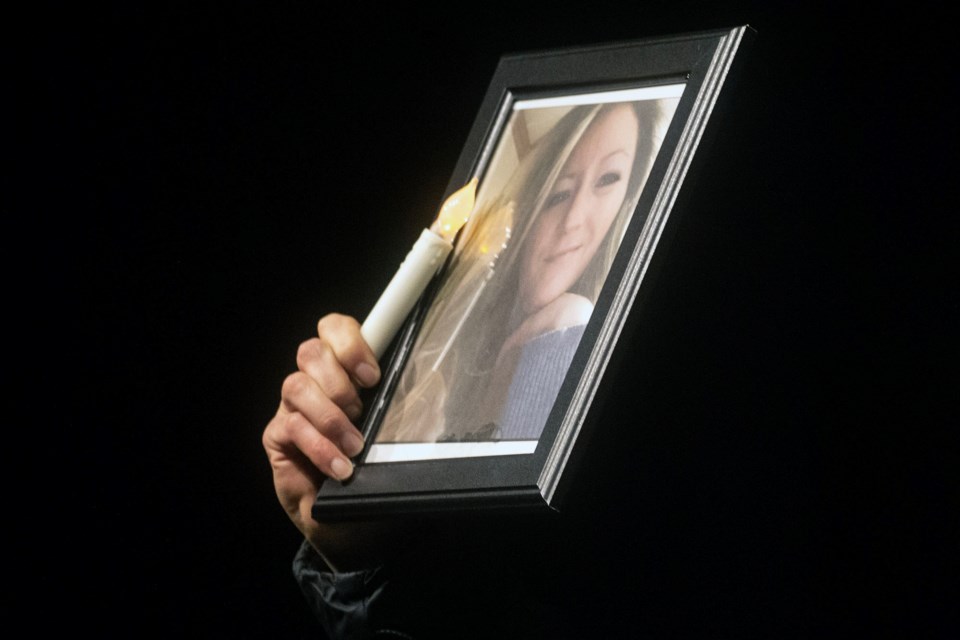Advocates are urging the Liberal government not to play politics with the remaining provisions under a firearms bill passed in December 2023, warning any further delay could put more women’s lives at risk.
Brian Sweeney, a self-described “broken-hearted man,” whose daughter Angie was fatally shot by her ex-boyfriend last year in Sault Ste. Marie, was among those who told Ottawa reporters Monday that the government needs to act quickly.
Angie was killed by a man who had a history of intimate partner violence, who, after killing her, headed home and shot his own three children and turned the gun on himself.
Sweeney helped found Angie’s Angels, an organization he promised will be “active” in the next election to rally Canadians in support of candidates who back Bill C-21, the Liberals’ hallmark gun control bill.
That legislation promised to bring in red and yellow flag laws by banning anybody under a protection order, such as a restraining order, from owning or possessing guns. Those convicted of domestic violence offences would also be subject to the prohibition, with officers ordered to revoke a licence within 24 hours if they have “reasonable grounds” to suspect that someone may have stalked or committed domestic violence against a partner.
Regulations to bring those rules into force remain in the works, a reality that Sweeney said is unacceptable and dangerous.
“Clearly, every month that goes by without these new laws being enforced in our cities, towns and across rural and remote communities puts the lives of women and children at greater risk,” he said.
“I can’t bring my daughter back, but what I can do is use my grief and great sadness to help prevent other femicides."
Nathalie Provost, a representative with gun control advocacy organization PolySeSouvient, expressed anger and frustration that the feds are not moving on the “potentially life-saving measures” with the urgency needed. She noted that no timeline has been given for the remaining regulations.
Suzanne Zaccour, a spokesperson for the National Association of Women and the Law, took it a step further and called on the feds to bring in the provisions before the next election. She argued that if they fail to do so, all four opposition parties must commit to upholding and enforcing the measures on their forthcoming platforms.
While the feds want red and yellow flag laws to come into force “as soon as possible,” the government did not elaborate.
“We understand the urgency to act and are giving ourselves the means to do so, including through the National Action Plan to End Gender-Based Violence,” a spokesperson for Public Safety Minister Dominic LeBlanc said in a statement, acknowledging that when a firearm is found in a home, the government knows “dangerous situations are more likely to become deadly.”
“Working with provinces, territories and groups advocating in favour of the fight against gender-based violence, we will bring everything to bear to put an end to this scourge.”
‘Common sense solutions’ left on the table
Alberta woman Tara Graham also shared her personal connection to the issue.
Graham’s mother, Brenda Tatlock-Burke, was shot and killed last month by her husband before he killed himself, an incident that sparked calls for greater transparency from the RCMP and how it addresses cases of domestic violence.
Graham alleged her stepfather, retired RCMP officer Mike Burke, was toxic and controlling during a three-decade-long relationship with her mother, who was planning to leave him just days before she was killed.
She added there are some “critical gaps” in gun control measures that could have prevented her mother’s death, including banning firearm storage within a person's home if their past suspicious behaviour is known and addressing the “myth” that physical harm is the only indicator of intimate partner violence.
“Educating both the police and public to recognize coercive control as an equally damaging form of abuse is key,” she added. “It would give victims of psychological and emotional abuse like my mother faith that reaching out to the police for help would be taken as seriously as a broken bone or black eye.”
Graham also urged parliamentarians to adopt the NDP's Bill C-332, a push to outlaw coercive control in cases involving intimate partners. That legislation, which the NDP has argued will help address “overlooked and downplayed” forms of abuse while addressing behaviours that instil a fear of violence in victims, remains at second reading in the Senate.
“The bottom line is our elected officials have a responsibility to act now” and before it becomes “too late,” Graham said.
“I speak today, so no other Canadian will have to travel to Ottawa to plead with you, your politicians, for these common sense solutions.”




